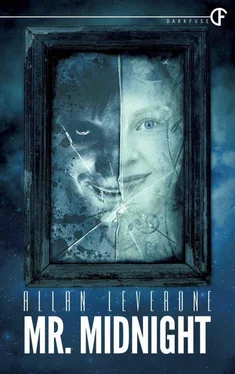Of course she would.
Unless, of course, the victims never left Strange Dude’s pad. Unless, of course, he kidnapped them and raped them and then, holy shit, killed them.
Was that really possible? Could the strange man living on the third floor of the building across the alley really be not just a rapist but a murderer as well? Franklin decided he had to find out. Because if that was the case, and Franklin didn’t do something about it, he knew he couldn’t live with himself.
Franklin slammed down the last of the MD and belched as it crash-landed in his belly. He felt good about himself, better than he had in a long time. He would figure out just exactly what was going on in Strange Dude’s third-floor love nest. And if the situation was as he feared, he would goddamn well go to the cops. Not in person, of course, Franklin hated the cops almost as much as he hated himself, but via anonymous phone tip, which would work just as well and represent less personal risk.
And that’s exactly what he would do.
Tomorrow.
Because tonight Franklin was so fucking drunk he doubted he could stand up, and he knew he couldn’t punch the numbers on a phone with any degree of accuracy. What Franklin needed to do tonight was sleep. He rolled the empty bottle along the pavement of the trash-littered alley and watched as it skittered and bounced, eventually coming to rest against the side of Strange Dude’s building.
Then Franklin stretched out on his blankets, determined to take action, proud he was still capable of doing some good in this world. In a matter of seconds, Franklin Marchand was fast asleep.
“What do you suppose the chances are that my mother will actually agree to see us?” Cait clutched the taxi’s worn vinyl door handle with one hand and held tightly to Kevin’s forearm with the other. They had just left the hotel for the cab ride to the address Arlen Hirschberg had supplied for Virginia Ayers, and the driver seemed intent on performing the same vehicular ballet as last night’s cabbie, changing lanes frequently and shooting in and out of gaps in the heavy traffic that seemed too small for a motorcycle, much less a full-sized sedan.
Kevin seemed unruffled and grinned, enjoying her obvious discomfort. He pried her index finger off his forearm and she chuckled uneasily. “Sorry about the death grip,” she whispered. “Do you think any of these guys actually, you know, have a real driver’s license?”
“Think of this as a little bonus. Along with a scenic trip through Boston we get a free amusement park thrill ride.”
“Free?” she said. “Obviously you don’t have a clear view of the meter.”
“Okay, maybe not free, but you get my point. Relax and enjoy the roller-coaster ride. This cabbie’s gotta be at least fifty, which means he’s been driving for close to thirty-five years and hasn’t been killed yet. How likely is it that this will be the exact moment he suffers his fatal accident?”
Cait punched her boyfriend in the arm and he laughed. The driver glowered at them through the rearview mirror and said nothing. “Anyway,” Kevin continued, “to answer your first question, I think it’s a toss-up. This woman”—he glanced at a small wire-ring notebook containing the information given to them by Arlen Hirschberg—“Virginia Ayers, turned Hirschberg down flat when he requested an interview, so it seems unlikely she will have changed her mind in the last twenty-four hours. I think our only realistic chance is to get her face-to-face and somehow convince her to share a few minutes of her time. Hopefully once she catches sight of you, once she gets an actual view of her long-lost child, she’ll have second thoughts about her refusal.
“So I don’t know, babe,” he said again, giving her hand a squeeze. “I wouldn’t give it any better than fifty-fifty, and even that might be a pipe dream.”
The ride continued in silence. Cait tried to push last night’s horrific Flicker to the back of her mind. She stared out the window and watched the cityscape roll by, the cab moving past tall steel and glass skyscrapers, past men and women in business suits carrying briefcases and walking briskly between buildings, through narrow one-way streets, some barely wider than alleyways, past restaurants and bars and universities and apartments, block after block of four-hundred-year-old city.
Finally the taxi left the skyscrapers of Boston behind, entering the smaller city of Everett. They drove a few minutes, the traffic still nearly as heavy, and eventually made a right turn at a weathered sign reading, “Riverfront Acres.” The driver cruised into a small neighborhood consisting of a half-dozen tiny cape-style homes huddled in a cluster around a narrow cul-de-sac. The pavement was cracked, desperately in need of repair, and the taxi bounced along crazily. All of the homes looked nearly identical except for their paint color. Cait couldn’t see any water and wondered where the river advertised on the sign might be.
The cab rolled slowly into a driveway barely long enough to accommodate its length. Cait and Kevin exited and while Kevin paid the cabbie, Cait examined the outside of her mother’s house, doing her best to ignore the nervous tension building inside her. At one time it appeared the house had been painted a deep ocean blue, but that had been years ago. Decades of New England weather and salty Atlantic Ocean air had rendered the siding a dull monochromatic gray, and the once-white trim had long since given way to encroaching mold and mildew.
In the picture window the curtains had been drawn against the morning sun, and it was impossible to tell whether anyone was even home. The place felt still, abandoned, and Cait supposed the same could be said for the entire neighborhood. No children played in any of the fenced-in front yards, no barking dogs marked their arrival. Nothing moved.
The cab backed out of the driveway and accelerated slowly down the street toward Everett and the land of the living. Cait grabbed Kevin’s hand and held on for dear life. “Am I making a mistake?” she asked in a small voice as they approached the front steps.
“Ever since I met you, you’ve had questions about your past,” Kevin said. “Now you finally have an opportunity to get some of those questions answered. Of course you’re not making a mistake. You’re just nervous. Settle down and let’s see what happens.”
“What if she slams the door in our faces?”
“Then we try to convince her to open it up again. If she refuses, we get that cab back here and enjoy another thrill ride back to the hotel, where we’ll get our things together and then fly back to Florida. Even if that happens, you’re no worse off than you were before, so you have nothing to lose,” he said, returning her hand squeeze.
He rang the doorbell. Cait could hear it reverberate through the house, loud and jarring, and she jumped.
For a moment nothing happened and then as Kevin was reaching out to ring the bell again, the heavy wooden door swung open and Cait’s mother peered through the screen at them, dressed in a threadbare robe and holding a cup of tea. Cait knew she was in her midsixties, Arlen Hirschberg had told them her age, but she looked much older. Deep creases lined her haggard face, and her hair, although the same auburn color as Cait’s, had somewhere along the line lost its luster and now looked dried out and brittle, as though it might snap off and clatter away in a stiff breeze.
The woman blinked twice, staring uncomprehendingly for what felt to Cait like hours but was undoubtedly only a second or two. Then she clapped her left hand to her mouth and took a step back, her eyes filling with tears. “Oh, my God,” she mumbled through her fingers. “Oh, my God. Oh, my God.”
Читать дальше












